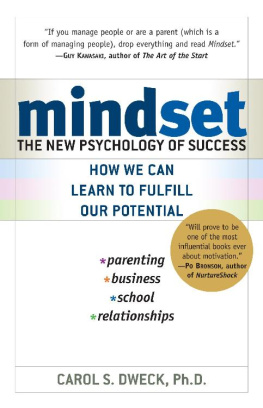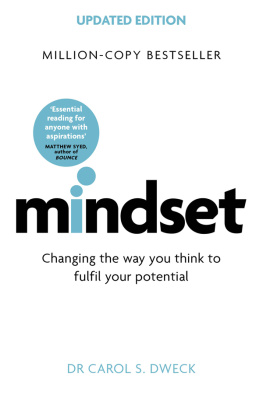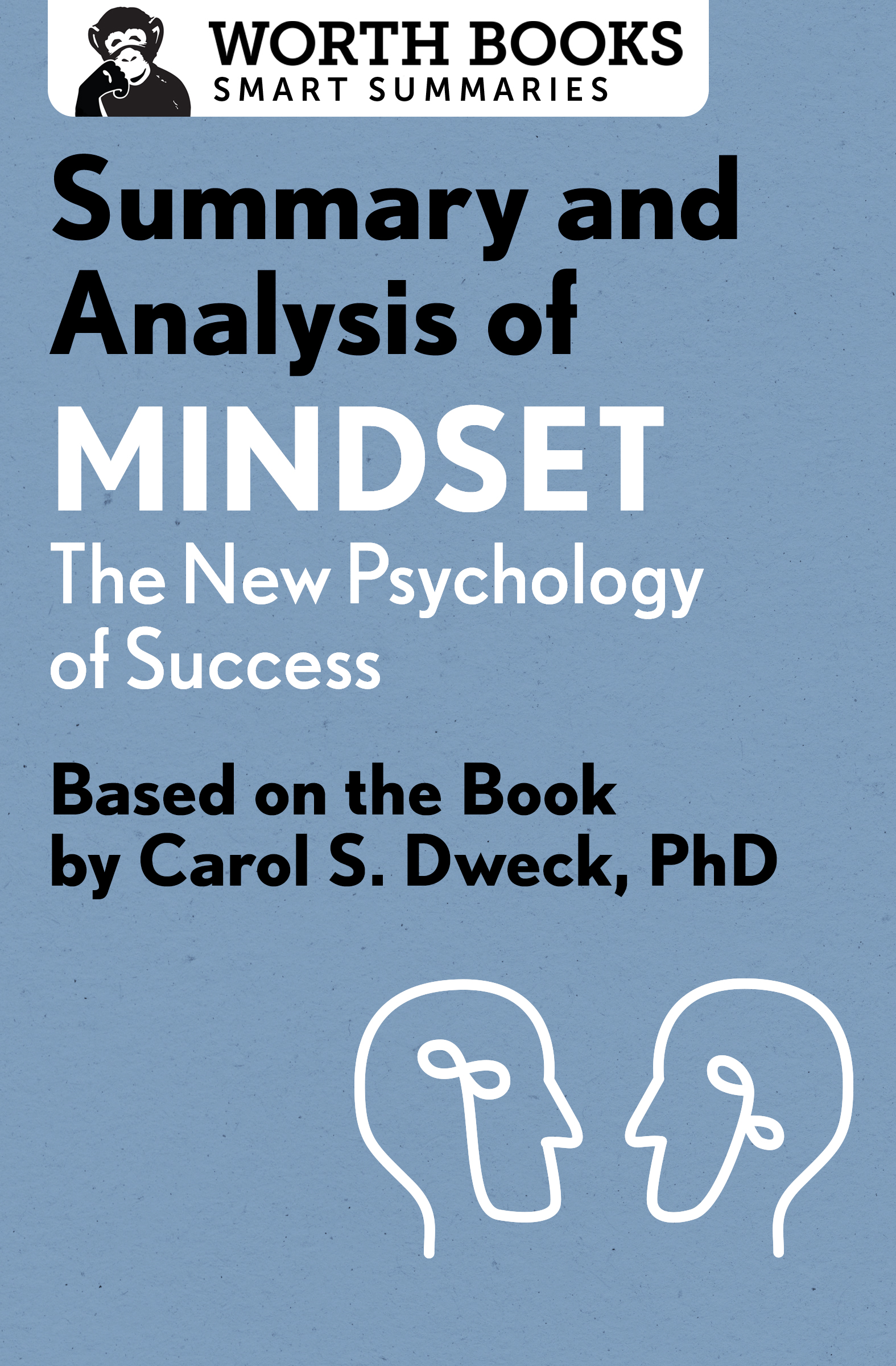Summary and Analysis of
Mindset
The New Psychology of Success
How We Can Learn to Fulfill Our Potential
Based on the Book by Carol S. Dweck, PhD

Contents
Context
In the wake of books such as Daniel Golemans 1995 bestseller Emotional Intelligence , there was an increased appetite for self-help books that didnt simply give peppy advice, but were also backed up with scientific research. Psychologist Carol Dwecks Mindset , which discusses how ones view of a situation can determine success or failure, has been praised for its accessible style, which allows it to bring psychology to a non-academic audience with real-life subjects and famous figures serving as the means to convey ideas.
Mindset builds upon the ideas expressed in Dwecks first book, Self-theories: Their Role in Motivation, Personality, and Development , in which she identified two contrasting views of intelligence: the entity view and the incremental view. The first sees intelligence as unchangeable; the second sees it as malleable. These views are the basis for the fixed and growth mindsets explored in her second book.
Mindset , which was published in 2006, also foresees a culture of helicopter parenting and Tiger Moms, warning of the consequences of placing too many expectations on children. The trials of disgraced Enron executives were still going on when Dweck was writing Mindset , and she refers to that scandal as a prime example of just how dangerous the wrong mindset can be. Mindset was also released at a time when the popular imagination was turning against such business megalomaniasuch as in the film The Corporation (2003), which suggested that if corporations were people, they would be psychopaths.
In the introduction, Dweck writes that her students at Columbia sat [her] down and ordered [her] to write this book. They wanted people to be able to use [Dweck and her students] work to make their lives better. The publication of the book completes the project of making her academic work available for everyone.
Overview
After decades of research, psychology professor Carol S. Dweck, PhD, concluded the most important factor in determining human success was not talent or intelligence, but attitudeor what she calls mindset . Dweck argues that there are two types of mindsets: a fixed mindset, which dictates that our ability to achieve is unchangeable, and a growth mindset, which says that we can improve our abilities through challenging work and practice. The fixed mindset makes our failures personal; we , as opposed to our actions, are not good enough. The growth mindset believes that persistence, hard work, and an openness to criticism are exactly what help us improve.
Dweck shows how the growth mindset works when applied to the key areas of our lives: schooling, work, and relationships. She looks at successful CEOs, athletes, and educators and highlights how a willingness to make mistakes and learn from feedback helped these individuals turn failure into success. She also looks at those imprisoned by the fixed mindset, such as infamous sports coach Bobby Knight and the disgraced leaders of Enron, and examines how a belief in inherent talent often prevents us from learning. As she explains, the fixed mindset dictates that we cannot become good enough and, therefore, leads people to give up at the first sign of difficulty. A growth mindset puts emphasis on process rather than results, teaching us to set store by our work ethic rather than our natural abilities.
Combining her own studies of grade-school children and college students with that of renowned psychologists, educators, and researchers, Dweck gives real-life examples of how our choice of mindset determines our trajectories in life. While she acknowledges that many factorsgender, race, and economic backgroundare out of our control, she contends that these do not have to dictate our ultimate paths.
Each chapter ends with a Grow Your Mindset section, in which the reader is asked to examine his or her own beliefs and actions regarding an area of their lives and use mental exercises to get into the growth mindset.
Summary
Introduction
Dr. Carol S. Dweck, PhD, a Stanford University psychologist, wrote Mindset after her students encouraged her to share the discoveries they had made together in class: mainly, that a mindset, rather than natural talents or abilities, determines failure or success in a given situation. Dwecks book aims to show people how they can change the way they experience their work, friendships, relationships, and goals by changing their perceptions. The key is adopting a flexible mindset that allows room for growth to succeed rather than seeing our personalities as fixed.
Chapter 1: The Mindsets
Dwecks concept of different mindsets came out of her experience researching how people deal with failure. In a study observing children who were asked to solve increasingly difficult puzzles, Dweck was surprised to see that several of the kids seemed to actively enjoy the harder puzzles. Rather than viewing the puzzles as chances to fail, these children saw solving them as chances to learn.
Debates over whether our trajectory in life is determined by nature or nurture have raged for centuries. Dweck notes that the IQ test, invented by French psychologist Alfred Binet, was not developed to prove that intelligence is fixed, but rather to identify children who were being failed by the Parisian school system.
Dweck believes that there are two mindsets: the fixed mindset and the growth mindset. In the former, one believes that his personality and talents are predetermined and cannot be changed. The growth mindset, on the other hand, says it is possible to change and improve intellect, skills, and talents. Dweck notes that many celebrated individualslike Charles Darwin and Leo Tolstoywere considered unremarkable early on in life. Their passion for self-improvement and their constructive responses to failure were what allowed them to succeed.
Dweck presents a scenario to determine subjects responses to three situations in a challenging day: a low grade, a traffic ticket, and a dismissive friend. People with the fixed mindset took the upsets of the day personally and became despondent. People with the growth mindset were philosophical and examined what had happened during the day to see what they could learn from it.
The mindsets are distinct in their attitudes toward risk and effort. The fixed mindset fears risk, as it carries the possibility of failure. Effort is similarly suspect, because surely if you have to try at something, it means you werent that good in the first place. This mindset results in an inaccurate perception of ones own capabilities. In studies, it is those with the growth mindset who estimate their own abilities accurately, because they can see both their strengths and weaknesses and are not afraid to receive criticism.
You can determine your own mindset by deciding whether you agree that intelligence and personal qualities are unchangeable or whether significant changes are possible. Dweck asks the reader to imagine himself in both mindsets and notes how those in the growth mindset are more likely to confront obstacles and see them as opportunities for growth.
Need to Know: Many other researchers support Dwecks theories. Psychologist Robert Sternberg, who performed poorly on IQ tests in grade school, characterizes intelligence as heavily influenced by opportunity and stimulation rather than a quality fixed from birth. Neuroscientist Gilbert Gottlieb supports Sternbergs belief, saying not only do genes and environment cooperate as we develop, but genes require input from the environment to work properly. Martin Seligman, known as the founder of Positive Psychology, estimates that talent and practice account fairly equally for our ability, but he also draws a distinction between talent inborn and involuntary, and strengths, healthy ways of thinking that we are able to learn (Olson, 2017).












